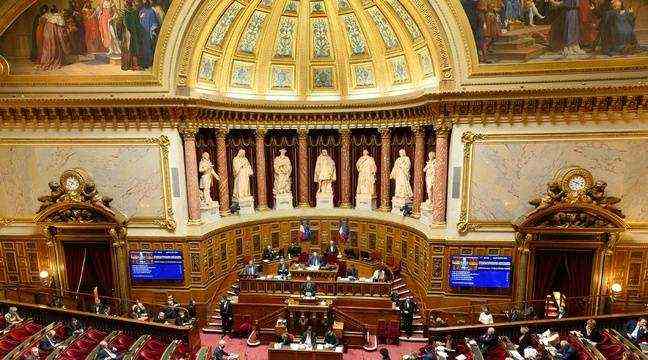The Senate, dominated by the right, discusses the bill to end the state of health emergency. (drawing) – Jacques Witt / SIPA
Adjustment of the calendar for greater clarity, reinforced supervision of the controversial “health pass” … The Senate dominated by the right-wing opposition undertook on Tuesday to reshape the bill for the gradual exit from the state of emergency. Unsurprisingly, the controversial health pass fueled most of the debates, which will continue into the evening.
At the end of the afternoon, the upper house voted at first reading, by 221 votes for and 109 against, article 1 of the text which provides in particular for the implementation of this device to fight against Covid-19. This tool must make access to large gatherings or certain places subject to presentation of a negative result of virus screening, or proof of vaccination, or even a certificate of recovery after contamination.
State of emergency at least until June 30
The senators specified that it could only be implemented in places which, due to their configuration or the nature of the activities they host, do not ensure compliance with barrier gestures. It could be presented in paper or digital form and the medical information to which those authorized to control it would have access would be restricted. In the hemicycle, a new series of guarantees was adopted by way of PS amendments, including the authorization by the prefect of the persons authorized to carry out checks.
The article as voted by the upper house plans to extend the state of health emergency until June 30, to take into account the maintenance of a curfew planned until that date. An “intermediate” regime would be instituted from July 1 to September 15, allowing the government to take restrictive measures in the face of the pandemic, to the exclusion of measures “strongly detrimental to freedoms” such as the closing of establishments.
“We will sort between first-zone and second-zone citizens”
This bill takes into account a “favorable trend”, but “it does not mark a clear break between the constraints imposed by the epidemic and the return to life before,” said Olivier Véran. It “outlines long-term prospects and sets up the conditions for safe and effective deconfinement, for sustainable deconfinement”, he added a few hours before the reopening of terraces, shops and places of culture.
The health pass crystallized the critics. The Communist-majority CRCE group was categorically opposed to it, as were about thirty senators from different sides. “The danger of tilting into the society of generalized surveillance is real”, argued the centrist Loïc Hervé, while Laurent Duplomb (LR) affirmed that “we will sort between first-zone and second-zone citizens”. “This health pass is a vaccination pass that does not say its name”, added Alain Houpert (LR).
The Modem sling
Claude Malhuret (Les Indépendants), on the contrary, called for its implementation to be speeded up, asserting that “not only is it not an attack on freedoms, but it is the means of regaining as quickly as possible all the freedoms reduced for years. month ”. He also received the support of the leader of senators LR Bruno Retailleau, for whom France’s strategy against the pandemic “must be based on mass vaccination […], but without abandoning the objective of breaking the chains of contamination ”.
In the Assembly, the government had to face last week a sling from the MoDem, yet a member of the presidential majority, and a surprise rejection of article 1. The text was finally adopted a few hours later.

